In an industry so dynamic and competitive, you always need to have a great waiter resume ready at hand. But how to prepare it? If you're looking for tips and examples that actually work, you're in the right place. Our easy-to-follow guide, accompanied with real-life waiter resume samples and templates, is here for you!
Keep reading to learn all about:
- Highlighting your best skills in a waiter resume.
- Including relevant certifications and education.
- Showcasing your POS and systems experience.
- Mentioning any additional hospitality skills.
- Accessing top resources for job-seeking waiters
Still looking for a job? These 100+ resources will tell you everything you need to get hired fast.
1. Highlight your best skills in a waiter or waitress resume
Service industry roles, like waiters, spend the majority of their time interacting with customers. The rest of their time is spent coordinating with the rest of the restaurant staff. That’s why service and communication skills are highly desirable among waiters. Often known as soft skills.
It’s much easier to teach someone the basic skills of being a waiter, like how to take orders or navigate a restaurant. However, soft skills can be much harder to train. In many situations, restaurant managers will prioritize hiring waiters with the right personal skills over professional ones.
Here are some soft skills that you can help make your resume’s skills section stand out as a waiter
- Problem-solving
- Customer service
- Conflict resolution
- Attention to detail
- Team player
- Communication skills
You can also highlight these skills more organically directly within your work experience.
Here are some good examples of communicating specific skills within role descriptions
- Conflict resolution – Effectively communicated with management and customers to resolve customer disputes.
- Customer service – Consistently received customer survey feedback indicating that customer expectations were exceeded.
- Team player – Worked closely with the host team and kitchen staff to provide guests a seamless experience during high-season.
- Detail-oriented – Efficiently inputted orders, resulting in 98% accuracy in customer orders.
If you’ve never worked in a restaurant setting as a waiter and are hoping to break into the industry, soft skills are the place where you can make an impact on the hiring manager. Just make sure that you’ve tied those key skills into the requirements on the job description.
2. Include any relevant certifications and education in your waiter or waitress resume
While waiter roles can sometimes be considered entry-level, there are often basic skills and education that are required. Some regions may also require specific certifications in order for waiters to handle food or alcohol. The names and types of certifications can vary significantly based on your location and restaurant type.
Even if there are no formal requirements, having relevant certifications is a great way to validate your skills and experience.
Some relevant certifications and education that are beneficial to include on a waiter resume
- Food handler certification
- Food safety certification
- First aid and CPR certification
If you have any other hospitality-related certifications, you may want to include these as well. For example, if you’re applying for a role in fine dining, a wine pairing certification would likely catch the eye of a hiring manager.
3. Showcase your POS and systems experience in a waiter or waitress resume
One of the biggest investments in a new employee is training. Before you can start navigating your new role independently, you’ll need to be familiar with any technology or software that is used. Being familiar with a potential restaurant’s point-of-sale system would make your application more attractive.
Popular POS systems for restaurants include Square, Lightspeed, TouchBistro, and more.
While having experience with the exact software is always helpful, it’s not always necessary. The skills are often transferable between software. Simply make it clear that you’ve used similar platforms.
Here are some examples for effectively communicating your skills and systems experience in your resume
- Efficiently managed customer orders through [software name]
- Managed cash and customer payments through [software] with 98% accuracy
- Maintained menu updates regularly using [software name]
4. Mention any additional hospitality skills in your waiter or waitress resume
When we say additional skills, we’re not talking about random skills like playing basketball or juggling. (Although some restaurants may appreciate these impressive skills!)
Depending on the specific restaurant, managers will often value new employees with diverse skill sets. This allows them to move you between different roles as required.
Here are some examples of additional skills that would be beneficial to include in a waiter resume
- Hosting and table seating strategies – many roles require waiters work closely or in tandem with hosts.
- Bartending – restaurants with bars often like to hire waiters who can double as bartenders
- Language proficiency – being fluent or even proficient in other languages can help improve the customer experience for guests, particularly in tourist areas.
Having additional skills listed on your resume can make you more employable.
5. Top resources for job-seeking waiters
You know the drill. Job seeking inevitably means hours and hours spent behind a computer screen. And a lot of that precious time gets wasted on trying to figure out where to look for job postings in the first place. If you're currently stuck in this exact place, you may find the following sources all the more useful.
- Industry-specific job boards: Websites such as Hcareers, Hospitality Online, and Caterer.com specialize in hospitality jobs, including waiter/waitress positions, offering a wide range of listings from casual dining to high-end restaurants.
- Indeed: Indeed is one of the largest online job boards that advertises job offers from all over the world. Just enter relevant keyphrases into the search bar and make your pick.
- Glassdoor: Apart from job postings, Glassdoor also offers insights into the company culture and salaries through employee reviews. Get to know your potential employer before you submit your application!
- LinkedIn: LinkedIn is the perfect means to explore the world of professional waiters. You can get in touch with hiring managers directly, or gain new and useful contacts by networking.
- Local restaurant websites and social media pages: Don't underestimate the power of the internet! You can reach out to establishments through their social media accounts or web pages. Take a chance!
- Continuous learning: Upskilling can make any resume more appealing to the eyes of recruiters. Take your time and browse through websites like Coursera, Udemy, or edX to find a course that best suits your goals.
Regardless of what restaurant you’re hoping to join, your resume needs to fit the bill of a waiter. You’re more than just someone delivering food and your resume is the place to prove it. Including the right skills and experience can help your CV stand out in a stack of resumes.
If you need some ideas to get you started, these Kickresume waiter resume examples are guaranteed to impress any restaurant manager.
Waiter Resume FAQ
How can I best showcase my skills on a waiter resume?
Make sure to highlight both your soft and hard skills relevant to waiting tables. For soft skills, emphasize your customer service, communication, and multitasking abilities. For hard skills, list any experience with POS systems, knowledge of wine pairing, and fluency in foreign languages if applicable. And also use bullet points to detail how you've applied these skills in past roles.
How should I format my work experience on a waiter resume?
Use a reverse-chronological format, listing your most recent job first. For each position, include the job title, employer's name, and the dates of your employment. Again, under each job, use bullet points to describe your responsibilities and achievements, focusing on those that demonstrate your competence and impact. You can also use quantifiers when it's possible.
What does it mean "to use quantifiers"?
Quantify your successes wherever possible. For example, "Increased upsell of premium wines by 30% through knowledgeable recommendations" or "Achieved a 98% customer satisfaction score based on feedback surveys." These concrete numbers provide tangible evidence of your skills and effectiveness.
Should I include references on my waiter resume?
It's more space-efficient to note that references are available upon request rather than listing them on your resume. This approach also gives you the opportunity to inform your references ahead of time if a potential employer requests their contact information.
I'm submitting my resume via ATS. How can I make it ATS-friendly?
Use a simple, clean layout without headers, footers, or graphics, which can confuse ATS software. Stick to standard fonts and incorporate the keywords featured in the job posting throughout your resume: in your summary, work experience, education, certificates, and skills sections. Save your resume in a widely accepted format, such as .docx or PDF, to ensure it's readable by the ATS.

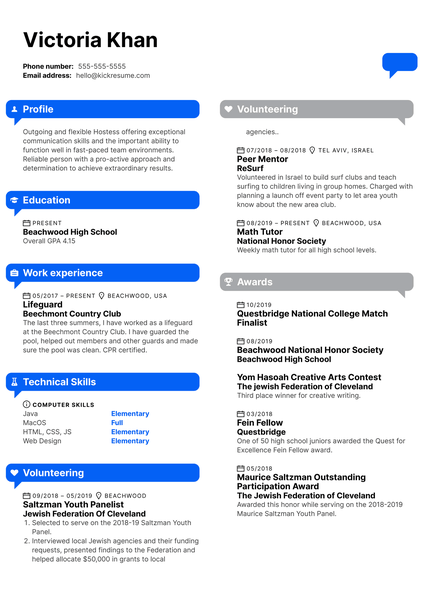

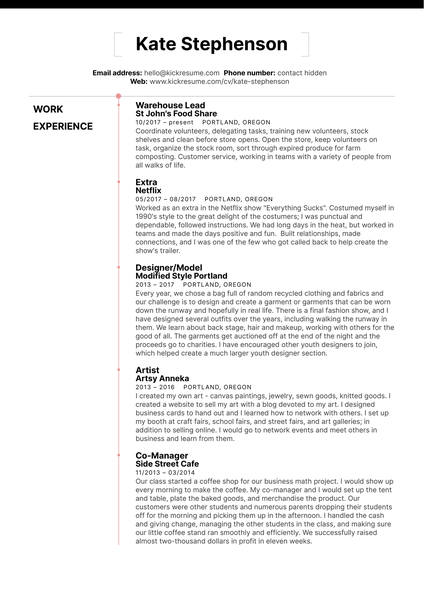

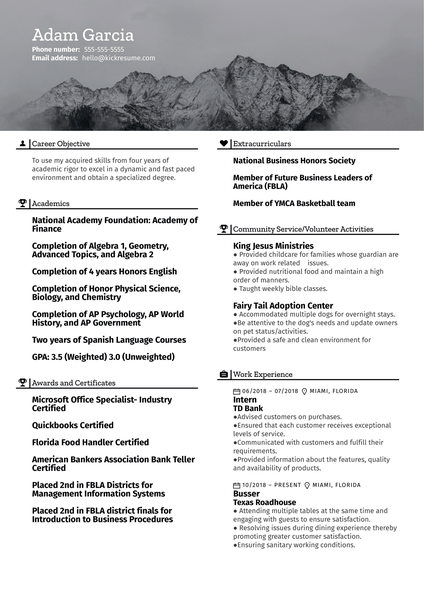

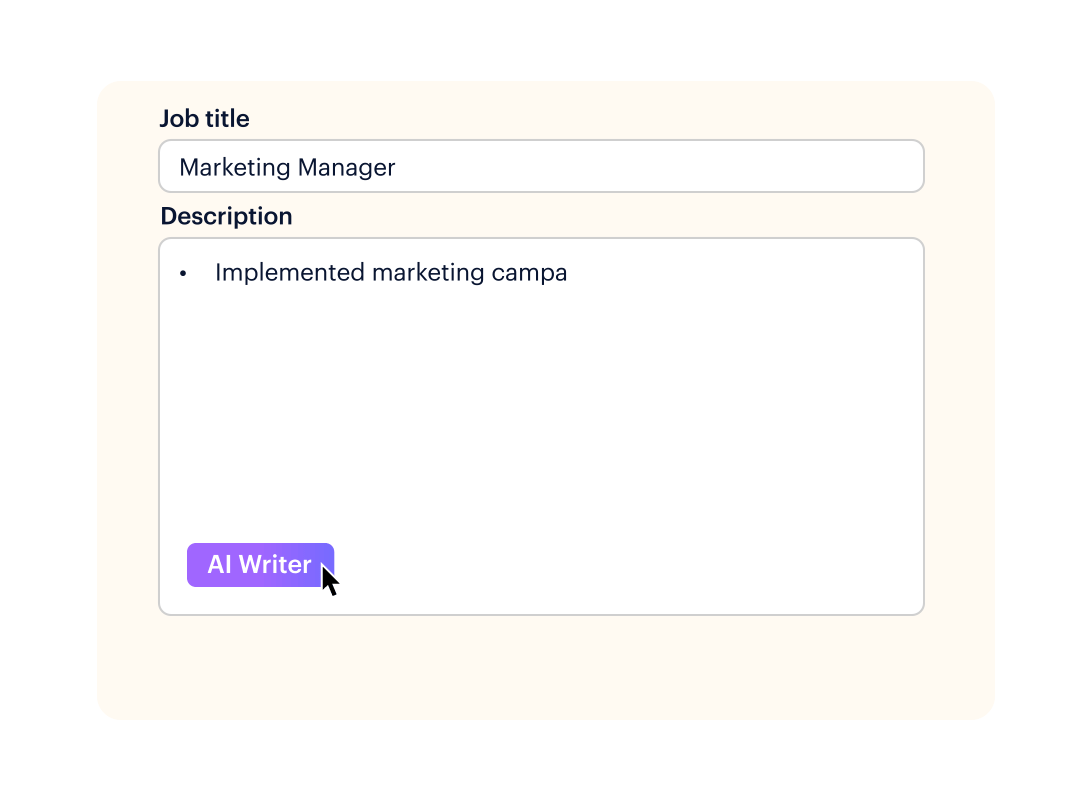

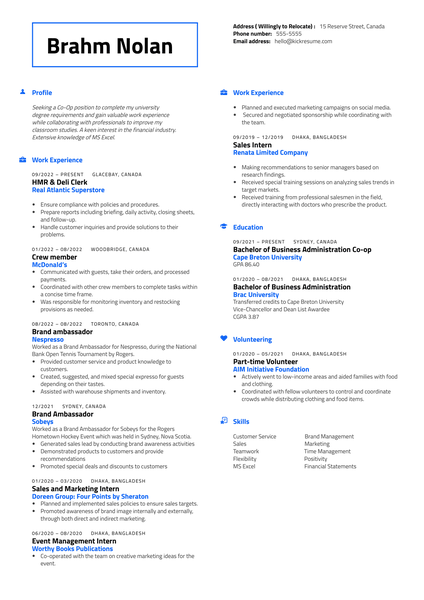

![Modelo Curriculum Vitae Hostess [PT]](png/thumbnail-437.png)

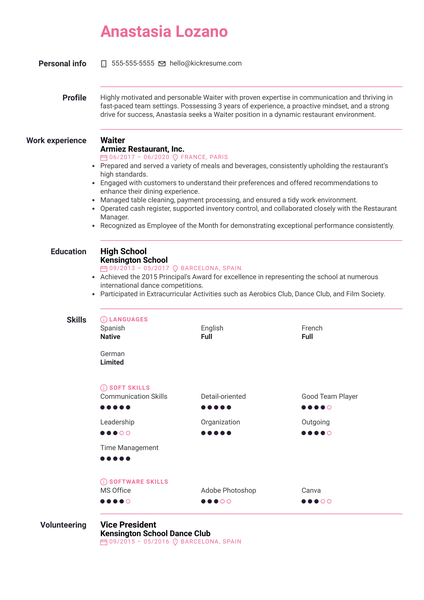
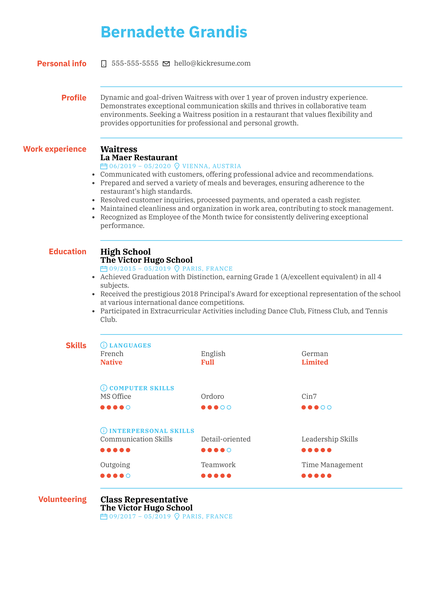

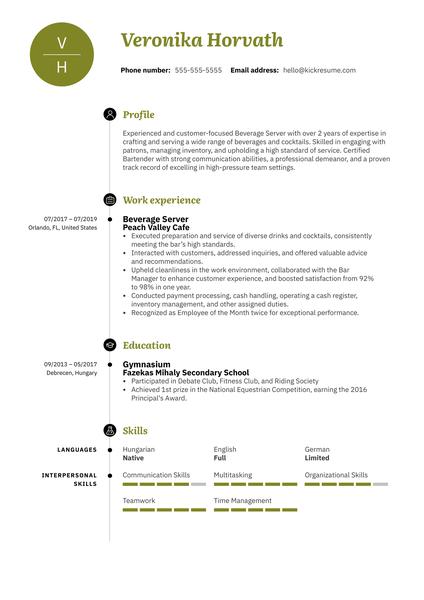
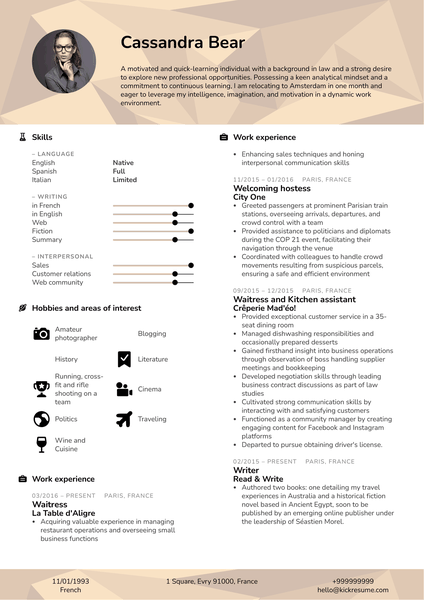
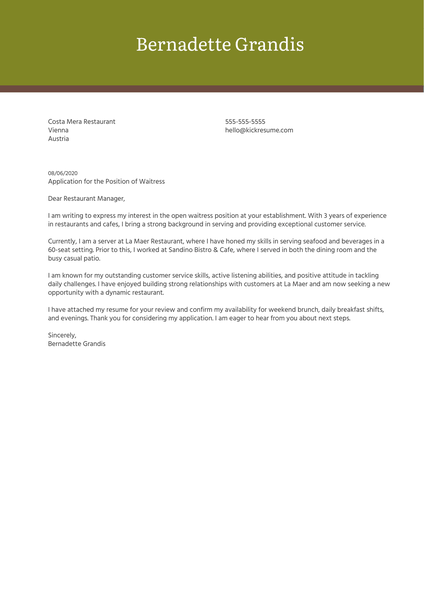
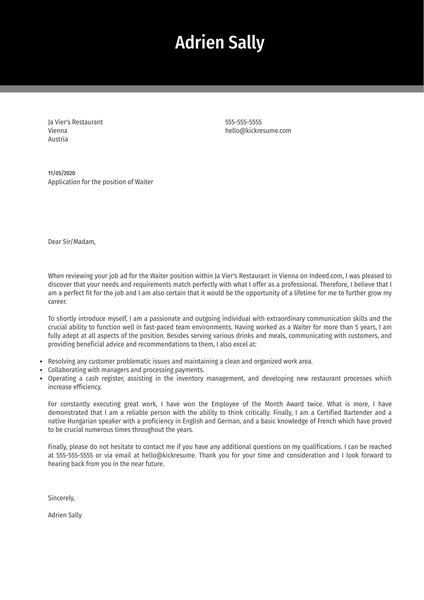
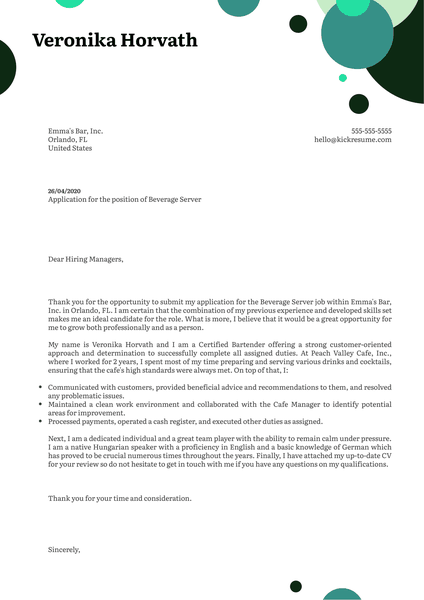
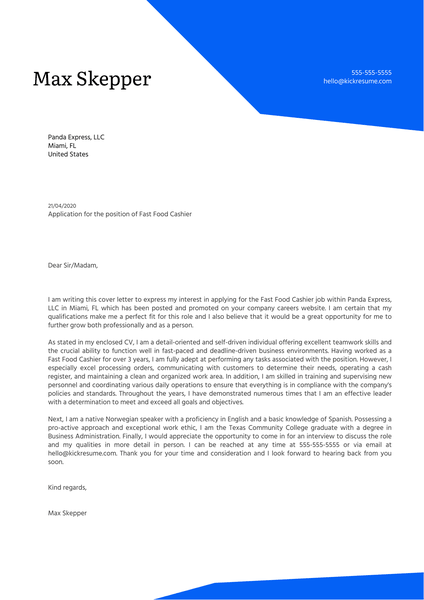
![How to Write a Professional Resume Summary? [+Examples]](https://d2xe0iugdha6pz.cloudfront.net/article-small-images/i-Profile.svg)
![How to Put Your Education on a Resume? [+Examples]](https://d2xe0iugdha6pz.cloudfront.net/article-small-images/i-Collage-Universities.svg)
![How to Describe Your Work Experience on a Resume? [+Examples]](https://d2xe0iugdha6pz.cloudfront.net/article-small-images/Experience.svg)


